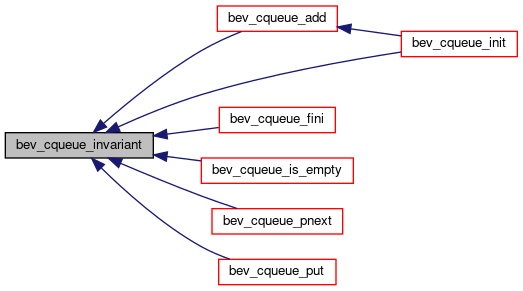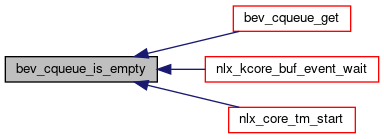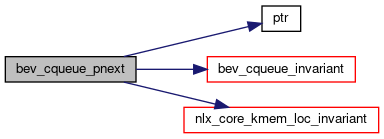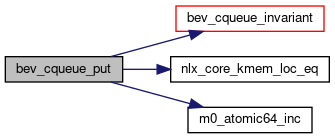
|
Functions | |
| static bool | bev_cqueue_invariant (const struct nlx_core_bev_cqueue *q) |
| static void | bev_cqueue_add (struct nlx_core_bev_cqueue *q, struct nlx_core_bev_link *ql) |
| static void | bev_cqueue_init (struct nlx_core_bev_cqueue *q, struct nlx_core_bev_link *ql1, struct nlx_core_bev_link *ql2) |
| static void | bev_cqueue_fini (struct nlx_core_bev_cqueue *q, void(*free_cb)(struct nlx_core_bev_link *)) |
| static bool | bev_cqueue_is_empty (const struct nlx_core_bev_cqueue *q) |
| static size_t | bev_cqueue_size (const struct nlx_core_bev_cqueue *q) |
| static struct nlx_core_bev_link * | bev_cqueue_get (struct nlx_core_bev_cqueue *q) |
| static struct nlx_core_bev_link * | bev_cqueue_pnext (const struct nlx_core_bev_cqueue *q) |
| static void | bev_cqueue_put (struct nlx_core_bev_cqueue *q, struct nlx_core_bev_link *p) |
| static void | bev_link_bless (struct nlx_core_bev_link *ql, struct page *pg) |
Detailed Description
The buffer event FIFO circular queue, used between the LNet Kernel Core and LNet transport.
Unlike the standard m0_queue, this queue supports a producer and consumer in different address spaces sharing the queue via shared memory. No locking is required by this single producer or consumer.
Function Documentation
◆ bev_cqueue_add()
|
static |
Adds a new element to the circular buffer queue in the consumer address space.
- Note
- The new element must already be blessed via bev_link_bless() in the producer address space. The cbl_c_self of the new element, ql, is set by bev_cqueue_add().
- Parameters
-
q the queue ql the element to add
- Precondition
- q->cbcq_nr > 0 && q->cbcq_consumer != NULL && nlx_core_kmem_loc_invariant(&ql->cbl_p_self_loc)
Definition at line 628 of file bev_cqueue.c.


◆ bev_cqueue_fini()
|
static |
Finalise the buffer event queue. Buffer events in the queue are freed using the specified callback.
- Note
- This operation is to be used only by the consumer.
Definition at line 682 of file bev_cqueue.c.


◆ bev_cqueue_get()
|
static |
Gets the oldest element in the FIFO circular queue, advancing the divider.
- Parameters
-
q the queue
- Returns
- the link to the element in the consumer context, NULL when the queue is empty
Definition at line 722 of file bev_cqueue.c.


◆ bev_cqueue_init()
|
static |
Initialises the buffer event queue. Should be invoked in the consumer address space only.
- Note
- both elements, ql1 and ql2 must be blessed via bev_link_bless() in the producer address space before they are used here.
- Parameters
-
q buffer event queue to initialise ql1 the first element in the new queue ql2 the second element in the new queue
- Precondition
- q != NULL && q->cbcq_nr == 0 && ql1 != NULL && ql2 != NULL
- Postcondition
- bev_cqueue_invariant(q) && q->cbcq_count == 0
Definition at line 658 of file bev_cqueue.c.


◆ bev_cqueue_invariant()
|
static |
Buffer event queue invariant.
Definition at line 609 of file bev_cqueue.c.


◆ bev_cqueue_is_empty()
|
static |
Tests if the buffer event queue is empty.
Definition at line 702 of file bev_cqueue.c.


◆ bev_cqueue_pnext()
|
static |
Determines the next element in the queue that can be used by the producer. This operation causes the page containing the next element to be mapped using kmap_atomic().
- Note
- This operation is to be used only by the producer.
- Parameters
-
q the queue
- Returns
- a pointer to the next available element in the producer context
- Precondition
- bev_cqueue_invariant(q)
- Postcondition
- p->cbl_c_self != q->cbcq_consumer
Definition at line 40 of file kbev_cqueue.c.


◆ bev_cqueue_put()
|
static |
Puts (produces) an element so it can be consumed. The caller must first call bev_cqueue_pnext() to ensure such an element exists. The page containing the element is unmapped using kunmap_atomic().
- Parameters
-
q the queue p current element, previously obtained using bev_cqueue_pnext()
- Precondition
- bev_cqueue_invariant(q) && p->cbl_c_self != q->cbcq_consumer
Definition at line 69 of file kbev_cqueue.c.


◆ bev_cqueue_size()
|
static |
Returns total size of the event queue, including in-use and free elements.
Definition at line 711 of file bev_cqueue.c.

◆ bev_link_bless()
|
static |
Blesses the nlx_core_bev_link of a nlx_core_bev_cqueue element, assigning the producer self value.
- Parameters
-
ql The link to bless, the caller must have already mapped the element into the producer address space. pg The page object corresponding to the link object.
Definition at line 92 of file kbev_cqueue.c.


